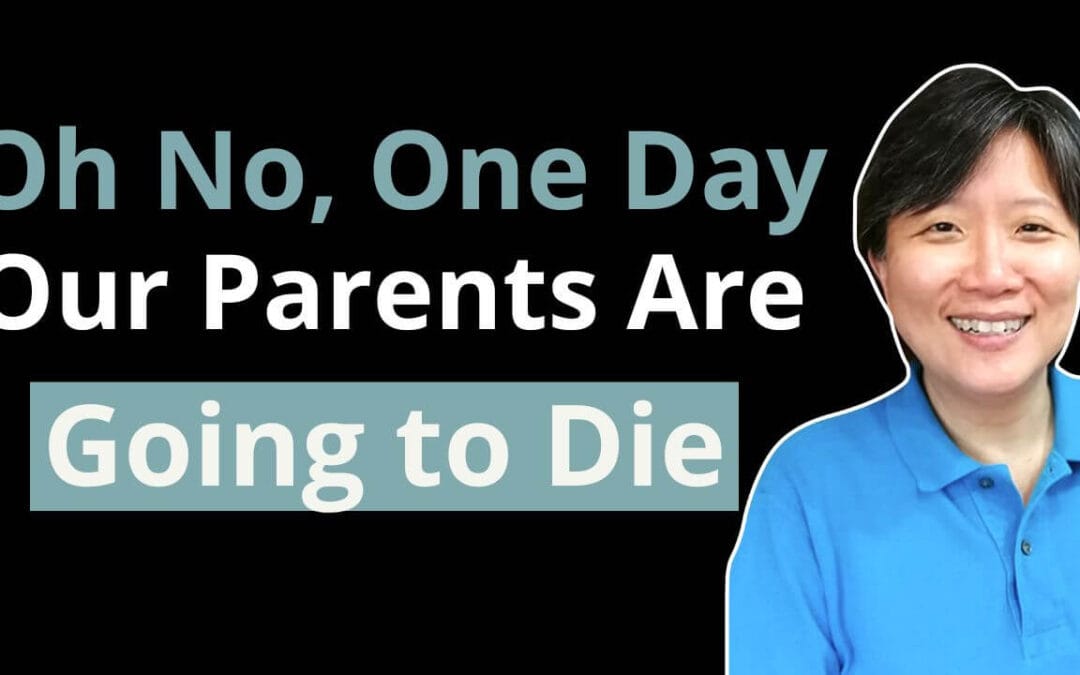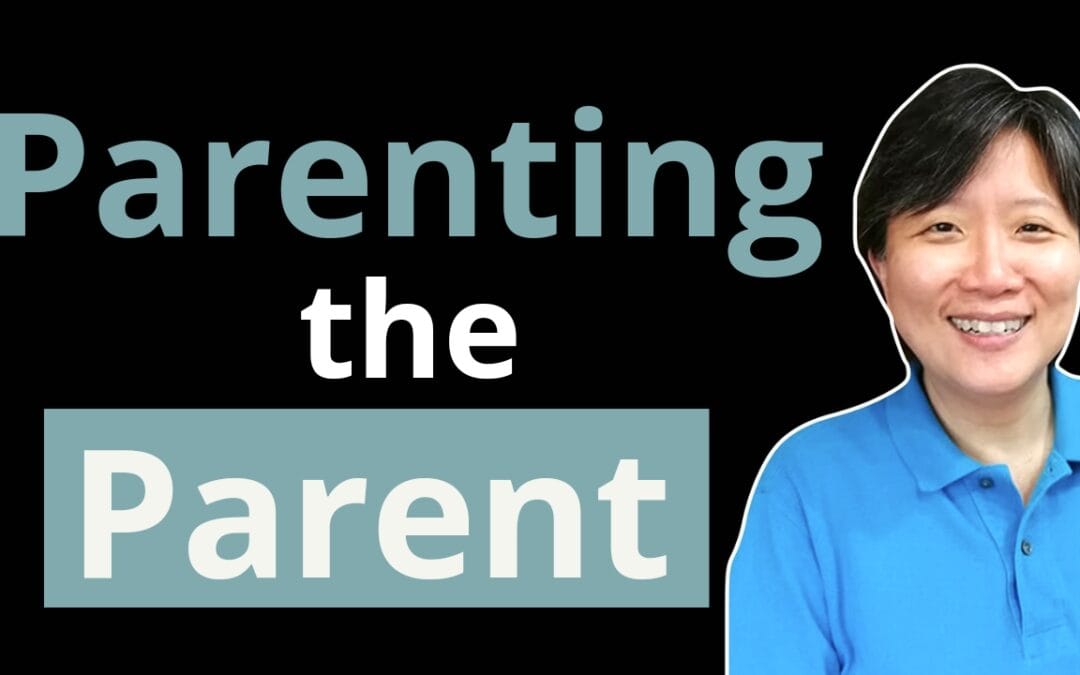
Ep 49: Oh No, One Day Our Parents Are Going to Die ft. Sis. Sylvia Bay
Summary
Navigating conversations about death can be challenging, especially with ageing parents. In this poignant episode, Sis. Sylvia Bay, esteemed Dhamma Scholar shares insights on how to approach the topic of death with our parents, particularly in cultures where discussing death is considered taboo:
🕊️Learn when is the best time and ways to discuss death with loved ones.
😔How to address feelings of regret and inspire ongoing positive actions in your loved ones.
🌱Understand the comforting concept of rebirth can transform the way we view death and mortality.
About the Speaker
Sylvia Bay has been dedicated to the study and practice of Buddha’s teaching since 1992. She graduated with a B.A. (Hons) First Class, in Buddhist Studies, from the Buddhist and Pali University of Sri Lanka in 2000 and joined the teaching staff of the Buddhist and Pali College (Singapore) in 2001. Since 2002, Sylvia has also been a regular speaker on Buddhist doctrine, Buddhist history, and the practical application of the Buddha’s teachings in daily life, at the invitation of various Buddhist organisations in Singapore. She published her first book in May 2014: the 1st volume of a 2-part series on the life of the Buddha which is titled, “Between The Lines: An Analytical Appreciation of Buddha’s Life”. Volume 2 was launched on Vesak day of year 2015. Sylvia also holds a B.Soc.Sci (Hons) from NUS and a Masters in International Public Policy (M.I.P.P) from School of Advanced International Studies (SAIS), Johns Hopkins.
Key Takeaways
Timing and Approach in Discussing Death
Sis Sylvia emphasises the importance of timing and a gentle approach when discussing death with aging parents. It’s crucial to choose moments when they are emotionally stable and receptive, avoiding sensitive occasions like birthdays or festive seasons. The conversation should be approached with love and care, using questions to encourage them to open up about their fears and emotions.
Spiritual and Philosophical Perspectives
Sis Sylvia discusses Buddhist beliefs about death and rebirth, highlighting how these teachings can provide comfort and acceptance. The concept of rebirth is presented as a continuation rather than an ending, akin to going on a journey where preparations are necessary but not fearful. This perspective helps in easing the fear of mortality and allows for a smoother transition.
Letting Go as an Act of Love
The discussion touches on the Buddhist concept that letting go of attachment is an act of wisdom and self-love rather than abandonment. By reframing grief and attachment with wise words and understanding, individuals can mitigate their pain and focus on the positive aspects of their loved ones’ transitions. This approach encourages accepting the natural course of life while cherishing memories without clinging to them.
Transcript
Full Transcript
[00:00:00] Cheryl: Welcome to the Handful of Leaves episode. I am the host Cheryl. The guests I have today is Sister Sylvia, an experienced Dharma speaker, practitioner and scholar. She has a lot of experience in Dharma practice. So I’m very excited to invite her. Welcome Sister Sylvia.
[00:00:19] Sis. Sylvia Bay: Hello
[00:00:20] Cheryl: In a culture where it’s a choi choi choi (taboo) thing to talk about death, how can we help our parents accept their own death, especially if they feel a lot of fear? And of course, how can we ourselves have a sense of acceptance and peace with our parents aging process?
[00:00:36] Sis. Sylvia Bay: Timing is important. Don’t choose to have a conversation like this near Chinese New Year, near people’s birthday. No, no, no. When they are happy, happy, don’t go and pour cold water.
So timing is important. If they were sick, it may not be terminal, but they are in a lot of pain. When you want to have this deeper conversation, you must make sure that you do it with a lot of love. You may require some hand holding, some cuddling, you know, some petting, hugging, and you ask, what are your feelings? What are your driving emotions now? Get them to talk by asking questions. If you say, what are you afraid of? They say, I’m not afraid of anything. If they say, I don’t feel anything, it may mean they are not ready to talk.
You tell them, sometimes it feels better, it feels good. When you ask questions, you share a little bit more about what you’re experiencing. You get them to open up and tell you what are their thoughts about whatever issue, death, pain, sickness . If you perceive that they are having some emotional angst, you have that conversation.
You ask them, how do they look at this? How do they feel about that? That sort of question. Open up. Then if you have a very good relationship with your parents, or at least there is trust, and they perceive that you’re someone who can understand, you’re not going to judge them. You are prepared.
Maybe you know a little bit more about that kind of thing, right? They will ask you, and this is where you will give them the facts. We believe in rebirth. We believe that when life ends, it doesn’t just end. This is our belief. We believe in rebirth and how. What is the Buddha’s Dhamma on this?
Minimally, you will move on. So in a way, don’t cast it as so final. See that in a way, it’s like going on a trip. You all pack up and when you reach a certain point, you must get your bags ready. Because sooner or later, it will come. Actually, that’s my conversation with my mom. I say think of death like you’re going on a trip, but it’s a long one because eventually I will also join you.
We’ll all be going on this trip. And to make it less frightening, because mortality is scary, death is scary, when you don’t have enough information, you don’t really know how to understand the issue, it’s scary. So you get them to open up by asking questions, and then it will lead to a point where you can then say, in my belief, in my practice, this is how we understand death.
The passage of time, passage of life, when the person die, if the person had form a lot of relationship, they have done very good things. You don’t have to be perfect. We are not perfect, but you’ve done good stuff. You have been kind. Then the mind gets lighter. It feels at ease. It’s not afraid to move on.
The transition will be very smooth. Nothing to be afraid of. They just need more information.
[00:04:18] Cheryl: What if at that point what comes up is regret? Regret that they have not lived a good life or a lot of the bad things that they’ve done.
[00:04:25] Sis. Sylvia Bay: And you will say, it’s not over yet. There’s still time to go and fulfill some of the things you want to do. There’s still time. No matter how, you never know where the end point is. Unlike PSLE, there is no A star, no one’s marking you.
And so you don’t have to worry about getting a C. What we can do, we do. You have to use words like that. Use words to lift the mind, to give people back some sense of control. You cannot control the point of departure, but you can continue to build your credit score. Give people the sense that they can continue to do something, and they can! The point is they can. To feed the animals, to link with the Dhamma. Then you just focus on generosity. Tell them stories in the Dhammapada. About what generosity can do. That is why I tell people, you must know stories, you must have some understanding of the Dhamma. You want to help your parents, you cannot help without understanding. You have enough understanding, you can help. You don’t have enough understanding, how can you help? You don’t even know what to say. So there’s this cute story of how this chap in his lifetime was making simple acts of generosity.
Gave some dana, small thing, really small thing. He was like giving vegetable. Here he gave, there in the Deva realm, something was appearing for him. Mogallana asked, is it true that when you do dana, you do something good, there is reciprocity somewhere in heaven? Buddha said you were there, right? You saw. Why keep asking me? So I took away from that story. You’re not doing good deeds for the merits. You’re just doing it because it has to be done. But at the same time, because you’re talking to your parents, you must assure them that, well, these are the stories found in the canon. You can choose not to believe. That’s okay. I’m just telling you, these are the stories. They would like this kind of stories because it’s reassuring. It calms their mind. It reduces their disquiet. So it’s good, good to tell Dhamma stories. And it’s so cute as well, the story.
And you just learn them and use them when the occasion arises. You can use that. So I want to just reiterate, just repeat this point. As long as the person is alive, you can still do something. Okay, as long as the person is alive, in small measures. And I can tell you from personal experience. Sanghas are very very kind, the monastics are very kind.
You tell them like someone is dying. You have never met the Sangha. You never met this chap, but you go to them and say, please, please, I need you to come and talk to my parents. They’re my mom, my dad, he’s dying and he needs help. They will come. Okay. They will come. No question asked. No money asked. Sure, sure. They come, to help.
[00:08:01] Cheryl: And the Sangha is also often described as the most fertile ground for merit. Yes. And the moment that the parents can see them, they can also do a lot of good as well.
[00:08:10] Sis. Sylvia Bay: Yes, yes. Actually, specifically is the Ariya Sangha. That is the biggest ground for merits. But still, Sangha is better than nothing. Any Sangha is good enough. In fact, many Sanghas that I have met and I know they are rich fields of merits and they know it.
So that’s why they will try their best to practice well and purify this. This is the merits. This is the one. If they are very well practiced and they’re very restrained in the way they conduct themselves. They have a lot of wisdom. Oh, very meritorious. As I said, I’ve done this. I tell you a personal story.
This one concerns Bhante Buddharakkhita. Every day he is in Singapore. His appointments filled to the hilt. You know, he’s busy. Someone was dying. And very last minute I approached him. I actually stood at Buddhist Fellowship (BF) waiting for him to arrive. And then I spoke to him and told him. And he said, okay, let’s go.
And then he was reminded that, eh, Bhante tonight you got some medical appointment. And he says, no, no, no, this is more important. Helping someone when they are transiting is more important than whatever treatments that you’re talking about.
So he went. So I’m telling you, Sanghas, be it Mahayana, Theravada, local, foreign. Everyone that I know, they will go because they know this is very important.
[00:09:46] Cheryl: Selfless.
[00:09:48] Sis. Sylvia Bay: Yeah. That’s why you need to go and look after Sangha. You need to support them so that they can continue doing the good work that they are doing.
[00:10:02] Cheryl: And on the side of the children, how can they accept this as well? Because of the love and attachment, it’s going to be very painful as well.
[00:10:11] Sis. Sylvia Bay: It depends on whether the person has any spirituality. If the person is Buddhist and reasonably familiar with the Dhamma, then it’s a reminder that this is the Buddha’s teaching. Right now, very hard, very painful, because of attachment.
Actually, the death in itself is not the painful part. The painful part is your thoughts, okay? The person dies, the person will die. But your thoughts come with, I will never see this person.
Ever. My parents have gone. I’m lost. It’s words like that. That will give you grief. So you have that attachment, and then you have, what’s the narrative, right? The narrative that speaks in a certain way. Those words will increase the longing. And because of the longing and the attachment, you feel grief.
Then you need to turn it around, use different words. Your parents, if they had died of old age, and they were suffering terribly before the end, the way you should speak is, at least they are now no longer, in physical pain. They have gone off to take on new role, new cars. They bought new car already. So I like to tease my mom sometimes.
People who don’t know us would say (you’re crazy). Oh my mom and I have this good, good laugh. Your car is old, lost COE already, you know. It is tired. It is breaking down. What you want to do because I know she’s not Arahant (Awakened Being) right? What you want to do is to go change your new car, change, change, move on.
So I repeat, your tears, your angst, your pain is because of attachment. If you use words unwisely, it will increase the pain. If you use correct words, you can actually mitigate your own pain. So you kind of balance it off. My parents have suffered. If I really do love them, I should let them go. Words like that.
My father and mother had a tough life. And you know they were good people so they will be Deva born, Bhuta born. Why are you so selfish holding on to them? Don’t you want them to get like promotion? So you say words like that to calm down your longing so balance it. I miss them and I always miss them. But at the same time I do feel happy for them. You focus on that focus on the correct words.
[00:13:20] Cheryl: Can letting go be also a form of love?
[00:13:26] Sis. Sylvia Bay: I know what you’re seeing. There’s a very romantic idea.
[00:13:31] Cheryl: I’m known as the Handful of Leaves hopeless romantic.
[00:13:35] Sis. Sylvia Bay: It’s a very romantic idea. Holding on to someone is attachment. Not holding on and allowing this notion that they are no longer in pain, they have moved on, it is wisdom, not love. For you to go in that general direction, it’s practice, it’s wisdom, it’s practice. It’s not in itself an expression of love, when you are able to say, I wish you all the very best. I am sincerely hopeful that you have a good rebirth. Those words are made out of affection. It’s like you’re rooting for someone you care about. Those words are made of affection and those words can help you to let go. It’s not about love. It’s wisdom. Your listeners may disagree, but this is how I see.
[00:14:36] Cheryl: Our listeners can also share in, in the comments what you think. We would love to hear from you as well.
[00:14:42] Sis. Sylvia Bay: You see, saying the words as follows, I wish you all the very best. I wish you all well. I hope that you’ll get a good rebirth. Those words are an expression of, it’s really a reflection that you care for them. That’s why you want them to do well. But the letting go in itself, right? Like let go, that itself is not about love. It’s really about wisdom. Okay. I just repeated the same point.
[00:15:12] Cheryl: Yeah. But I’ve not lost like parents before. So I’m just thinking,
[00:15:17] Sis. Sylvia Bay: Oh, you have in other lives. Okay.
[00:15:19] Cheryl: Yeah. Many too many. But in this, I’m just, I’m just applying that to friendships, relationships on how to do that. And it’s true that I think the difficulties is the attachment and I don’t have the antidote. I don’t have the wisdom to be able to fully let go. That’s why then the struggle is there. Yeah.
[00:15:46] Sis. Sylvia Bay: You hold on to the relationship, isn’t it? When you’re holding on to a relationship, it’s not love. It’s you loving yourself. You see if I love you, I want you to love me. But actually it’s because I love me that I want you to love me. You know what I’m saying? This, this cute little exchange, it has a story.
King Pasenadi, fat king he really loved the Buddha. Every day he must go find Buddha. Once he finishes his state business, he knew that Buddha was around, he will go and visit. So one day King Pasenadi had this conversation with his favorite wife, Queen Mallika. He asked this question, who do you love the best?
He was expecting her to say, you your Majesty, right? She said, me. He was very disappointed. He was extremely upset. Then he went, I also love me the best. Then they went their separate way. That day he talked to the Buddha, he complained. So unhappy. The Buddha said, she’s very wise, you know, she’s very wise. She’s essentially saying that you will always love yourself the best. I’d love you to love me. If I say I love you, okay, and I expect that you will say you love me. Actually it’s really because I love me.
Everyone would love themselves the most. Okay. So she was right. She loves herself the most. It’s not about him. It’s just about her. Who do you love the most? You love me the most, which is correct. He got upset, right? It’s because he loves himself the most for real, not out of spite, which is for real. Maybe he doesn’t realize. He thought he was just saying it out of spite. He doesn’t have the wisdom. She had the wisdom. And honesty. And honesty. Because she was wise. She needed him. She understood. She just wanted to jolt him up. And of course, he got jolted out. He was very upset about it. So because we love ourselves so much, we want others to love us.
[00:18:02] Cheryl: But then how do we let go then? Is that where we let go of the sense of self?
[00:18:06] Sis. Sylvia Bay: You let go, okay ah, this word let go. I’m not sure if I like that word per se. You cannot hold on to the person anyway. The person passes on or the person leaves you, he leave you.
It’s his choice, okay? You are letting go of desire. You’re not letting go of him. You’re allowing your desires, your urge, your need for him to reciprocate or for your parent or your loved one not to pass on, right? You are refusing to let go of your attachment to the relationship or to the memory of the relationship.
You’re clinging onto them. Maybe, there is a part in you that is afraid that if you allow your grief to settle and allow the attachment to settle, you’re betraying that person, or you are forgetting that person. And it hurts to forget because you want not the person not to be forgotten.
Maybe there is this wrong view. It’s not a helpful view. You must understand that when a person can’t let go of another, it’s actually because the person cannot let go of the attachment to the idea. Cannot let go of his pleasure, his desires. He cannot.
He must remember that. It’s nothing to do with the other fella. The fella is moved on already. Dead or gone. It’s moved on. It’s yourself. If you can say, okay, no need to replicate that experience. No need to be in the arms of so and so. No need to call this person father, mother. He’s moved on. I accept that.
Accepting the end of a repeat of the episode. Not the memory. Memory is still there. Maybe I’m sounding a bit too deep.
[00:20:12] Cheryl: I know what you mean. It’s just need to let that sink in a bit.
[00:20:19] Sis. Sylvia Bay: Yeah.
[00:20:21] Cheryl: Hmm. Yeah, because that really changed my perspective that it’s not about the person. It’s really bringing back to our own desires, our own clinging to all those pleasures.
[00:20:35] Sis. Sylvia Bay: Correct. Absolutely.
Correct.
[00:20:39] Cheryl: That may be the game changer, right? Because then that’s when we stop writing about, Oh, the person’s so nice, so whatever.
[00:20:47] Sis. Sylvia Bay: No, you accept that it’s over. You cannot replicate that experience, that whatever the experience is, it’s a faint version of it residing in your memory and you accept that you are okay with that.
We would always have lost someone. All of us have. I’ve lost my father, I’ve lost my, my grandparents. I have friends who have passed on. And when my friend from overseas, after the lady died, my friend and I, we went to a grave and she had a good cry because it’s a loss. It’s to know that someone you care about as a . Really good friend. We hang around and chit chat, chit chat, chit chat, right? You will never be able to repeat that episode because the third person is gone and you’re attached to the memory of it, the pleasure of it. And if you can see that it’s okay, he’s moved on, she’s moved on and is now in a better state.
It’s your love for the person, you’re wishing this person well. And then for your own part, for the love of you, you will say, I let you go. Otherwise you will be clinging and be in pain. It’s love for yourself.
[00:22:05] Cheryl: Yeah. Yeah.
[00:22:06] Sis. Sylvia Bay: Okay.
[00:22:07] Cheryl: It’s purely just suffering, right? Clinging. Yes, it’s pure Suffering. We have covered a lot in this wonderful episode talking about how we can skillfully talk to our parents about death, mortality, and that really is about getting them to open up and then sharing certain facts about death.
And then we go on to talk about love and the letting go of desire which requires self love and love for the other person as well. And so with that, we come to the end of the episode. Thank you for staying all the way to the end. And please give us a like on YouTube and share with your friends. And yeah as usual, stay happy and wise, and we’ll see you in the next episode. Thank you.
Special thanks to our sponsors:
Buddhist Youth Network, Lim Soon Kiat, Alvin Chan, Tan Key Seng, Soh Hwee Hoon, Geraldine Tay, Venerable You Guang, Wilson Ng, Diga, Joyce, Tan Jia Yee, Joanne, Suñña, Shuo Mei, Arif, Bernice, Wee Teck, Andrew Yam, Kan Rong Hui, Wei Li Quek, Shirley Shen, Ezra, Joanne Chan, Hsien Li Siaw, Gillian Ang, Wang Shiow Mei, Ong Chye Chye, Melvin, Yoke Kuen
Editor and transcriber of this episode:
Cheryl Cheah, Susara Ng









